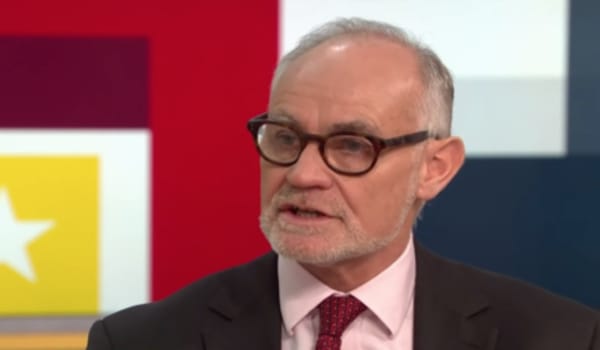Let’s be Blunt, Mr Brokenshire …
Witness what MP Crispin Blunt from Surrey has to say
No time for mincing words
No time for wasting taxpayers’ money
And certainly no time for land inequality

By Harry Scoffin
In the run-up to last Thursday’s announcement that future leasehold houses and monetary ground rents on flats are to be banned, LKP received a hard-hitting letter.
Its author?
Crispin Blunt, the Conservative MP for Reigate with impeccable credentials on leasehold and commonhold.
Noting that Help To Buy rules are set to change, Mr Blunt states that Communities Secretary James Brokenshire “should not pass on this golden opportunity to signal this Government’s support for commonhold ownership for flats, in preference to leasehold title ownership.”
LKP is celebrating last week’s government announcement. But we encourage Mr Brokenshire to take his colleague’s advice and continue restoring fairness to the housing market while he is riding high and still in post.
Mr Blunt’s plan is ingenious: change Help To Buy regulations to ensure apartments are sold as commonhold or share of freehold ONLY. He urges government to act out of principle:
“To have taxpayer subsidy applied to support the antiquated and iniquitous practice of selling flats as vulnerable leasehold tenancies across England and Wales would be a grave oversight of this Government.”
If government is alive to the chokehold of leasehold – which we believe it is, despite seeming reluctant to publicly admit it for fear of freeholder backlash – why should hardworking taxpayers continue funding a cosy cartel of housebuilders to sell leases, not homes? How is this good for society?
Consumer homebuyers “should not be encouraged to leave the landlord in the private rented sector only to face a new kind of landlord as a mortgaged tenant in the unregulated leasehold market.”
Passing leaseholds off as true home ownership will not end well:
“Leasehold is not ownership. It gives the occupier the right to live in the property, as with any tenancy. Leasehold is an inferior and lesser title to freehold and commonhold, an objective reality that impacts all major aspects of living; operational, functional, legal, financial, and monetary and social capital.”
Mr Blunt’s Help To Buy letter cleverly falls short of demanding an outright ban on leasehold in the wider new-build flats market. Indeed, any sunset clause on new leasehold flats would be politically undeliverable in the immediate term.
If government runs with the Blunt compromise, developers would still be able to sell leasehold property. They would just have to comply with the changed guidelines — or wave goodbye to the lucrative state contracts they have enjoyed under Help To Buy.
Mr Blunt claims further bold action is needed to ensure government is “safeguarding consumer vulnerability, especially first-time buyers” as it is now doing over houses and future ground rent.
LKP understands Mr Blunt has included share of freehold as an option to ensure developers can build mixed-use, a type of development unsupported by the 2002 Act. (Residents’ management companies can also be mandated where developers must retain the freehold for large and complex sites.)
And where commonhold lacks provision for shared ownership, it is thought the product can be made to work alongside share of freehold arrangements.
Time to stop putting sticking plasters on long leasehold law
Enfranchisement alone is the concern of some 50 different Acts of Parliament.
Government has in the past acknowledged the bewildering complexity of leasehold, suggesting that the numerous “statutory controls” placed on landlords by successive administrations have failed to make flat living fairer and more harmonious for lessees. It is why the Ministry of Justice gave such a strong endorsement of commonhold in its unpublished report of 2009.
In 1998, government said that leasehold “has its roots in the feudal system and gives great powers and privileges to landowners. It is totally unsuited to the society of the twentieth – let alone the twenty-first – century.”
In the letter, which was sent to the Secretary of State in early June, Mr Blunt implies that the work being done on formulating a new service charges regime will be fruitless:
“I appreciate the Government has declared its ambition to end opaque service charges which bear no relation to the work carried out to apartment blocks, which is reflected in the working group being led by Lord Best.
“However, no regulation or law can eliminate the structural deficiencies of leasehold title as these are intrinsic to the very nature of it being a mere ‘lease’.”
LKP reserves judgement. Lord Best’s report is expected to be published later this month.
But it is hard to disagree with Mr Blunt’s analysis. Leaseholders can challenge the service charges under the new regime all they like. However, there will still be a place for the speculator in their home and legal loopholes to exploit.
Mr Blunt is spot on:
“As debates around inequality continue, it must be remembered that owning the earth, ground, water and soil upon which one’s home is built, means access to land capital, control over management of land rights, and debt liberation from the shackles and chains contained in the lease for one’s home.”
Leasehold does not trust consumer homeowners to set their own service charge budget, unlike their counterparts across the rest of the world, who do not require the benevolent rule of a third-party landlord.

Government has recently compared leaseholding with renting. While leaseholders have an asset in the lease, their capital values and rental yields largely depend on the choices of others. Lessees have the majority financial stake in these buildings, but have no control over how their money is being spent. This is indefensible.
Freehold owners may be driven by the profit motive, encouraging their appointed managing agent to help them sweat the asset and let the building become rundown as they pocket the fees. They will care far more about income than capital, especially when the property has been leased for 999 years.
Leasehold was never meant to be fair – you CANNOT make it so.
Mr Blunt and LKP are not the only ones who think this. The government’s legal adviser Professor Nick Hopkins says:
“… so you don’t have the control people expect when they buy their home … Reform of leasehold can mitigate the effect of those [of having a wasting asset and being in a landlord-tenant relationship], but it can’t remove them. The only way to remove those concerns is to move to a different form of ownership.”
LKP hopes that MPs articulate the need to heed Mr Blunt during the three-hour marathon debate in the Commons next Thursday.
The letter can be read in full here: CrispinBluntLetterJune2019





 Government’s slightly wobbly response to the excellent report of the Communities Select Committee
Government’s slightly wobbly response to the excellent report of the Communities Select Committee





















